








Kupu Arataki – Introduction... pg 3-8

› Quiz – Fruit and vegetables... pg 7
Ā mātou korero – Our people
› A message from Executive Director of Nursing, Waitaha Canterbury | Te Tai o Poutini West Coast, Becky Hickmott for International Nurses Day 2023...pg 8
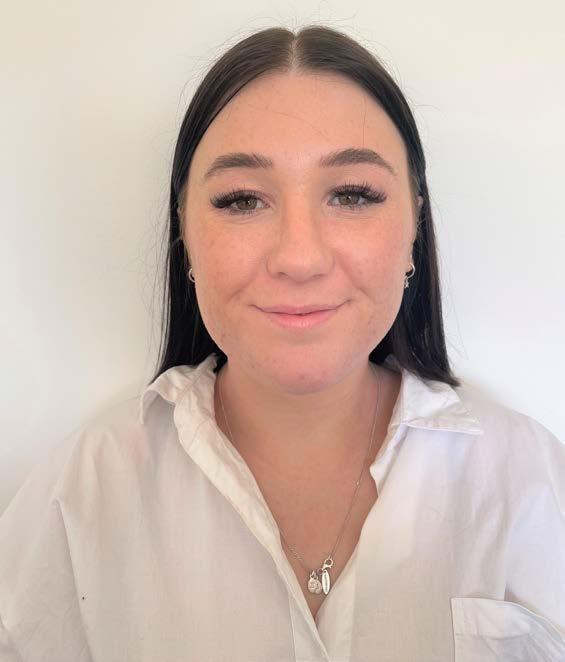
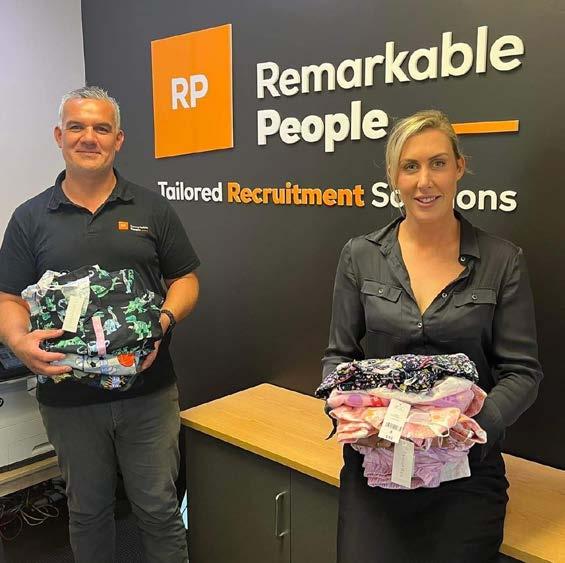
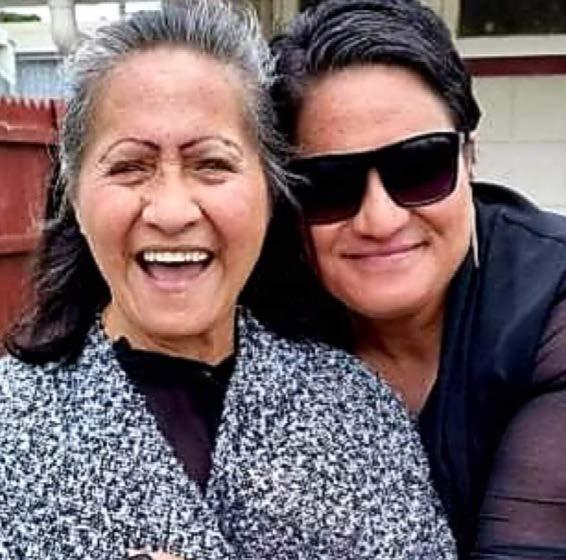
› Meet our nurses: The future of nursing is in good hands... pg 10

› Meet our nurses: Rural nursing builds strong community relationships... pg 111
› Overcoming challenges and building a stronger team... pg 12
› Celebrating life after breast cancer... pg 13
› One minute with … Rachel Lauchlan, Trauma Nurse Coordinator (TNC)... pg 15
› Akoranga reo Māori – lesson #13 Kīwaha - Idioms... pg 19
› International winter warmer recipes... pg 17
Whakamihi – Bouquets... pg 19-20
Ā mātou korero – Our stories
› New Zealand Sign Language Week – breaking down barriers, fears and misconceptions... pg 21
› We need to talk about privacy... pg 23
› Pacific Language Week – Rotuma... pg 24
Pānui – Notices... pg 25–28
Cover photo: Celebrating International Nurses Day. The Nursing Entry to Practice Programme (NETP) registered nurses, (RNs,) and Enrolled Nurse Supported into Practice Programme (ENSIPP) enrolled nurses, (ENs), who started at Te Whatu Ora Waitaha Canterbury in January 2023. They were attending the NETP/ENSIPP Critical Thinking Study Day at Manawa.
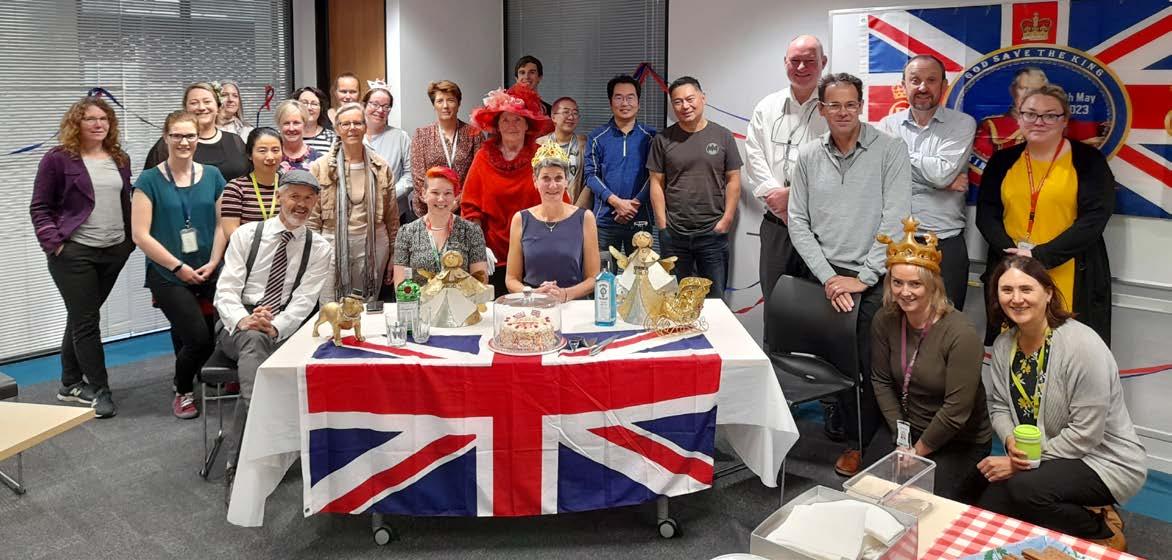

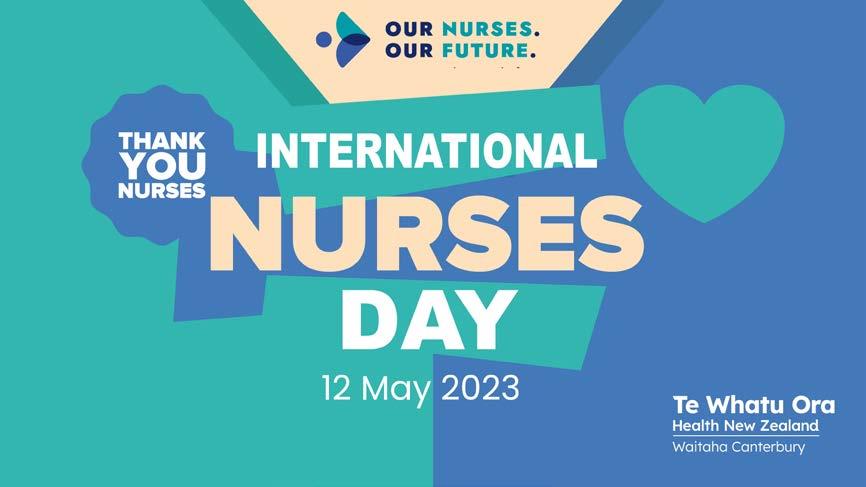
Friday 12 May is International Nurses Day, celebrated around the world on Florence Nightingale’s birthday. The theme for this year is 'Our nurses. Our future'. According to the International Council of Nurses (ICN), this theme sets out what ICN wants for nursing in the future in order to address the global health challenges and improve global health for all. We need to learn from the lessons of the pandemic and translate these into actions for the future that ensure nurses are protected, respected and valued.
For the rest of the month, we are going to dedicate space in the pānui to our nurses. We will meet people new to nursing and those with years and extensive experience under their belt. We’ll learn about their passion for what they do and their hopes for the future of nursing.
This week, we meet two new nurses on pages 10 and 11. One will graduate as a registered nurse later this year and the other is just months into her role in rural Canterbury.
Nurses are the heart of our health system. They are calm among the chaos; a soothing comfort or a firm hand as required. Expert clinicians who care not just for their patients and consumers but also their friends and whānau. Multi-tasking and multi-skilled, they give their best when others are going through their worst.
We thank you all for everything you do.
To honour past and present nurses there will be a short ecumenical service in the Nurses’ Memorial Chapel on Thursday 11 May from 12.15-12.45pm. All welcome. If anyone would like to assist on the day, please contact: angela.mccormick@cdhb.health.nz
New Zealand Sign Language (NZSL) Week starts today and Deaf Aotearoa is encouraging Kiwis to put their hands up and give signing a go to promote inclusivity for the Deaf community. Learning a few basic signs can make a big difference in the lives of Deaf people, helping them to feel seen and valued.
There are NZSL classes taught by members of our Deaf community all over the country. Resources to learn some basic signs can be found at nzslweek.org.nz and the NZSL dictionary is available online at nzsl.nz
Every May, Deaf Aotearoa organises NZSL Week to celebrate one of the country’s official languages and Deaf language and culture. NZSL became an official language in 2006 after many years of lobbying and the first NZSL Week took place in 2007. Read more on page 21


Minister for Pacific Peoples
Barbara Edmonds has announced the 2023 Pacific Language week series, highlighting the need to revitalise and sustain languages for future generations. Pacific languages are a cornerstone of the health, wellbeing and identity of Pacific peoples. When the languages are spoken, heard and celebrated, communities thrive.
The initiative aligns with UNESCO’s International Decade of Indigenous Languages which recognises the right to preserve, revitalise and promote languages. UNESCO findings indicate that at least 40 percent of the 7,000 languages used worldwide are in danger of being lost.
Language Week celebrations had their origins in Samoa in 2007 and two years later the Human Rights Commission came on board to support the communities and the concept of Pacific Language Weeks was born.
Two recent measles cases in Auckland have closed a high school and highlighted the importance of ensuring our pēpi, tamariki and rangatahi are fully vaccinated.
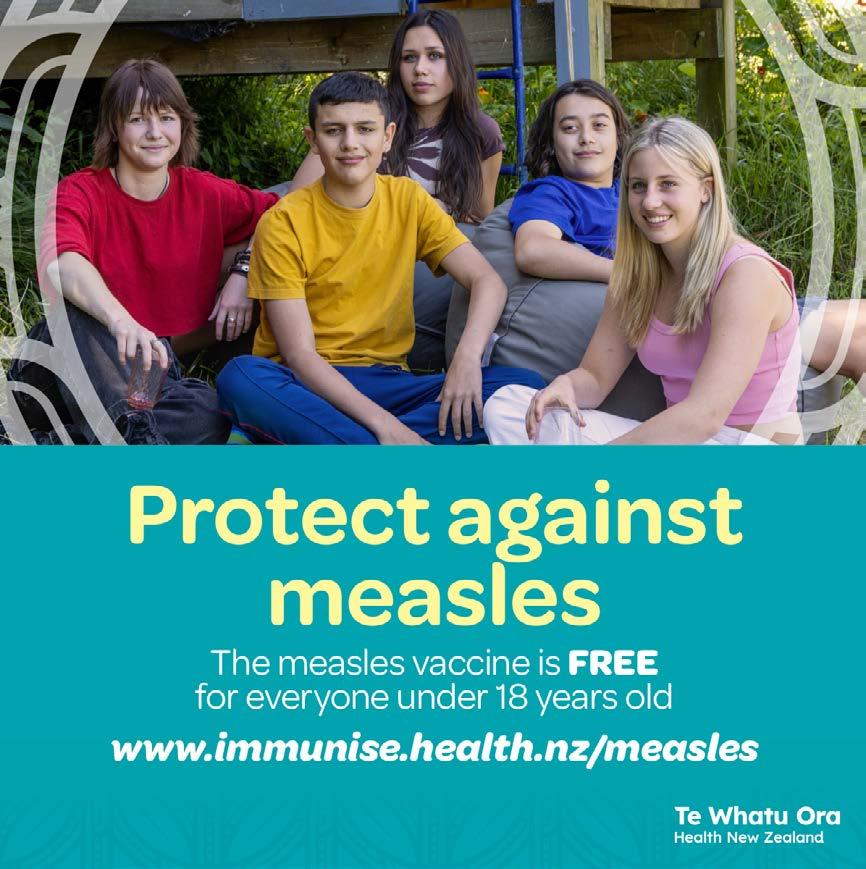
The measles, mumps and rubella vaccine (MMR) is free to anyone under the age of 18.
If you or someone you love was born between 1989 and 2004, you may have missed out on one or both of your MMR vaccines. Check with your parents, GP or health professional to find out if you’re covered. If you’re not sure, there is no harm in getting vaccinated again.
Measles is highly contagious and potentially lifethreatening, especially for very young children, pregnant māmā and older people. It can also cause ear infections, diarrhoea, pneumonia, and swelling of the brain, making you very sick. Protect yourself and your whānau and ensure you’re fully vaccinated.
Since 2010, the Ministry for Pacific Peoples has been supporting Pacific Language Weeks, promoting and raising awareness of the diversity of our Pacific languages in Aotearoa. Each year, the Ministry works closely with Pacific communities to maintain and promote indigenous languages across the country, encouraging their use in our daily lives.
So, let’s celebrate each of these unique languages which enrich and diversify our country. The first to kick off the series is Rotuman. Learn more about it on page 24

Since a request went out last month for donations of new pyjamas in children's size one to 16 to give to children staying in Christchurch Hospital, about 200 pairs have been generously donated and gone out to the wards.
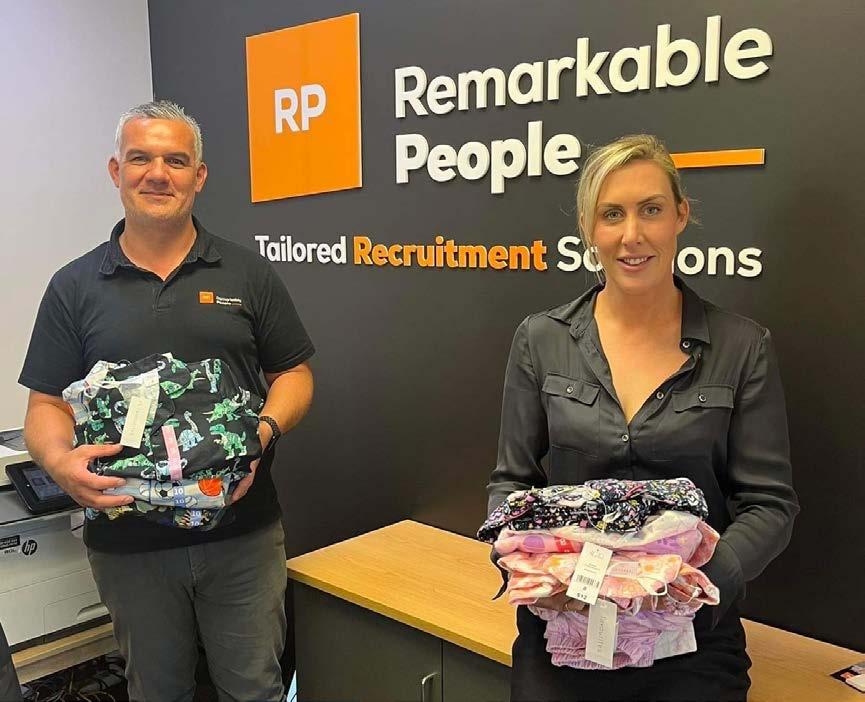
With the weather getting cooler, Christchurch Hospital Volunteers restarted their ‘Jammies for Juniors' programme in April. The latest donation is from Remarkable People which donated several pairs of warm flannelette pyjamas.
Volunteer Coordinator Louise Hoban-Watson says it’s wonderful to have kind people looking out for our young patients and it would be great to have more.
For those who wish to, the volunteers are now able to take money donations for the purchase of pyjamas.
Ka pai!
Donated pyjamas should be:
› New and flannelette
› In child sizes 1 - 16

› Have button-up tops
› Meet NZ safety standards.
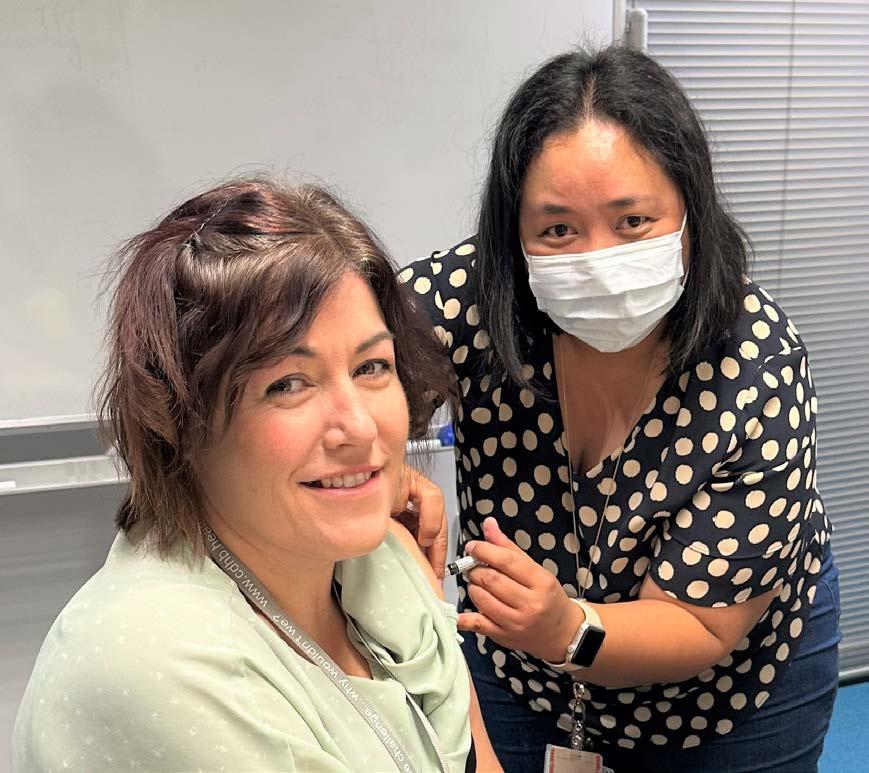
A reminder that Te Whatu Ora Waitaha Canterbury staff are eligible for a free flu vaccination.
If you haven’t had yours already, please check PRISM for the details of when and where you can get yours at various clinics across our campuses.
If you’re eligible for the bivalent COVID-19 booster, don’t wait until we see an increase in infections during winter; protect yourself now. You can find a vaccination clinic on the Vaccinate Canterbury and West Coast website – many offer walk-ins or book in advance through Book my Vaccine.
Donated PJs can be dropped off at Christchurch Hospital, either at the main Reception desk, the Volunteers' Office or to a WayFinder volunteer (they wear a blue ‘Can I help you?’ vest).

Many would have stayed up late on Saturday night watching the pomp and ceremony of the coronation of King Charles III.

Some marked the event with parties and celebrations, including Waitaha Canterbury’s Commissioning and Business Intelligence team (pictured below) who celebrated in advance last week.

Full of vitamins, minerals and healthy goodness, how much do you know about fruit and vegetables?
1. Botanically, what is a pumpkin?
a. Fruit
b. Vegetable
c. Legume
d. Nut
2. Kaduku plums are native to Australia. What is special about them?
a. They are a bright blue colour


b. They have the highest known concentration of vitamin C
c. They’re popular with animals but toxic to humans
d. Per gram, they’re the most expensive fruit in the world
3. What is the most consumed fruit in the world?
a. Apples
b. Grapes
c. Watermelon
d. Bananas
4. What was the first food grown in space, in 1996?
a. Carrot
b. Potato
c. Onion
d. Tomato
5. What country produces the most oranges?
a. USA
b. China
c. Brazil
d. Australia
6. The Polynesian ancestors of Māori brought kūmara to Aotearoa New Zealand when they arrived in the 13th century. Where is it believed they obtained the kūmara from?
a. South America
b. Easter Island
c. Tahiti
d. Hawaii
7. True or false. Carrots were not originally orange in colour.
a. True
b. False
8. A 2010 survey by New Zealand Gardener magazine revealed that the potato was our favourite vegetable. What was voted New Zealand’s most hated vegetable?
a. Cauliflower
b. Peas
c. Brussels sprouts
d. Broad beans
9. Which of the following is true of cucumbers?
a. A fresh slice of cucumber can effectively shine your shoes
b. Sucking on a piece of cucumber can fight bad breath
c. Cucumbers can be grown in water
d. All of the above
10. Native to North America and rich in vitamin C and antioxidants. What fruit is considered the healthiest in the world, a superfood with links to health benefits including a reduced risk of cancer, increased insulin response, a reversal in age-related memory loss, and lowering blood pressure?
a. Blackberry
b. Blueberry
c. Raspberry
d. Strawberry
Check your answers on page 26.
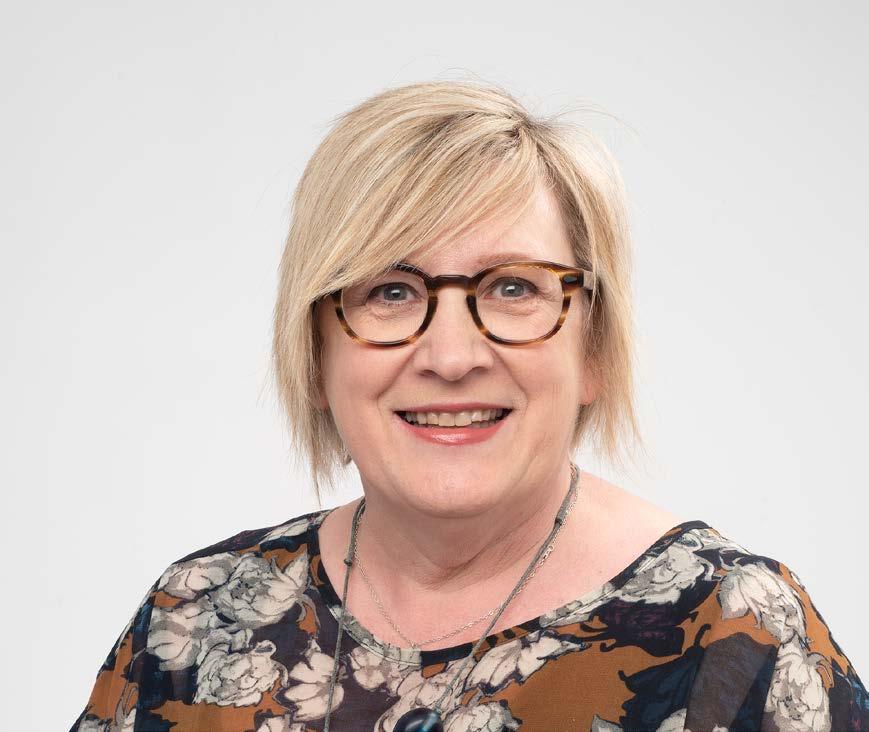
This year we celebrate International Nurses Day on Friday 12 May. The Te Whatu Ora Waitaha Canterbury Nursing Midwifery Leadership Group would like to acknowledge and celebrate our 8582 nurses who hold practising certificates across the Waitaha Canterbury Health System. Nurses and healthcare assistants are an integral part of our health system, without them our people/whānau/ communities would not be able to receive the best care that we can offer in these challenging times of change.
The International Council of Nurses (ICN) theme for international nurses day this year is “Our Nurses. Our Future”. The ICN is advocating for “nursing in the future to address the global health challenges and improve global health for all”. In addition to this they also state “that nurses move from invisible to invaluable in the eyes of policy makers, the public and all those who make decisions affecting and financing of health care”.
Nurses have an enormous amount of knowledge and many diverse skills they spend years perfecting and developing, all the time working in decidedly complex environments and across individual people’s life spans. We acknowledge that in this current environment, we need to continue to explore contemporary ways in which we enable nurses to provide the best possible care for individuals and their whānau. The last couple of years have been challenging but we recognise that you go that extra mile each day to ensure the Waitaha community and beyond are cared for.
To those who have volunteered to help out our colleagues in the upper North Island affected by the recent cyclone and devastating floods, thank you for your mahi. I am sure we all remember, value and appreciate the awesome help we received from across the country during our time of need 12 years ago. It means a great deal to me that you are supporting other regions in this way.
The Nursing Council, as many of you will be aware, is working on a number of changes this year, particularly around the review of the enrolled nurse scope of practice, which has two key proposed changes; the inclusion of Te Tiriti o Waitangi and the removal of the direction and delegation component. This work is well under way and these changes will then be reflected within the education standards and competencies, which in turn will involve a registered nurse scope of practice and competency review. Also changing is the Competency Assessment Programme (CAP) for Internationally Qualified Nurses (IQNs) at the end of the year. IQNs have contributed significantly to addressing previous staffing shortages and are crucial in the current environment. They make up 24 percent of the Waitaha Canterbury nursing workforce and 70 percent of the aged residential care workforce. We maintain our strong commitment to continue to 'grow our own' workforce as well and are grateful for the strong relationships with our local education sector.

We wish also to acknowledge the integral role that nurses play in achieving equity for Māori and in giving meaningful effect to Te Tiriti o Waitangi.
As the largest regulated heath workforce in Aotearoa, with the greatest individual and whānau contact time, nurses have a significant opportunity to enact impactful and enduring change within our healthcare system, as we strive towards Pae Ora –Kia kotahi te hoe – let's paddle in unison.
This week I encourage you to take the time to recognise the true value and importance of what you do – you are providing care that at the very least improves lives and can in fact be life-saving.
You are essential to the people of Waitaha Canterbury; safe, compassionate and effective care cannot be provided without you.
Thank you for all your hard work, the kindness and compassion you share with others, and the expert knowledge and skills that you share and use every day. Kia kaha, kia māia, kia manawanui.
Ngā mihi o te rangi tapuhi o te ao - Happy International Nurses Day!
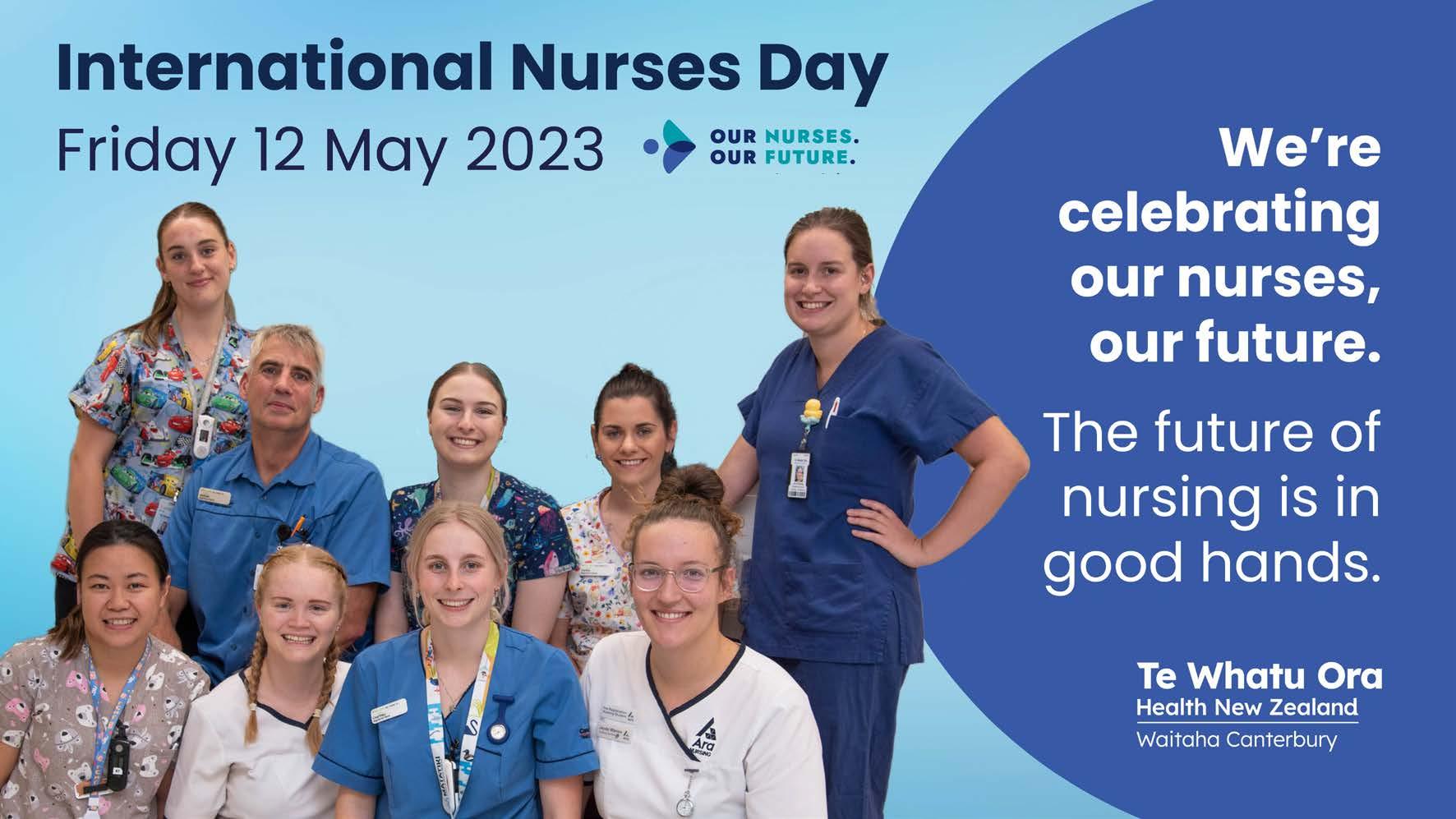
The following Māori proverb lends itself quite well to this concept that together we can make it better for our people under care, their whānau/ communities and ourselves, supporting each other as a colleague and in a nursing team.
Nāu te rourou With your foodbasket
Nāku te rourou With my foodbasket
Ka ora ai te iwi The people will thrive
 Becky Hickmott Executive Director of Nursing
Becky Hickmott Executive Director of Nursing
Waitaha Canterbury | Te Tai o Poutini West Coast
When Avishek ‘Avi’ Gosai was six years old, he was interviewed on local television in Suva, Fiji, where he was born.
The youngster was asked what he wanted to be when he grew up and although he had difficulty articulating his response, he knew he wanted to work in healthcare. Little Avi wanted to replicate the career of his aunt, a woman he admired greatly; he wanted to be a nurse.
Fast forward to today and Avi has been living in New Zealand since 2008 and is seeing his dream fulfilled. He currently works parttime at Burwood Hospital while completing his training. He will qualify as a registered nurse in October this year.
In 2022, soon after beginning a regular shift at Burwood, Avi was called aside and asked if he could provide some support at Christchurch Hospital which was struggling due to staff illness and overwhelming demand. He spent two shifts on the Christchurch campus, helping out all over the hospital, including in the General Surgical wards, Parkside Ground Medical and the Emergency Department (ED). His efforts were detailed in the 14 November 2022
Waitaha Pānui
Although he enjoys working in Older Persons’ Health in Burwood, the experience at Christchurch Hospital was eye-opening and has influenced Avi’s view of his nursing training and development.
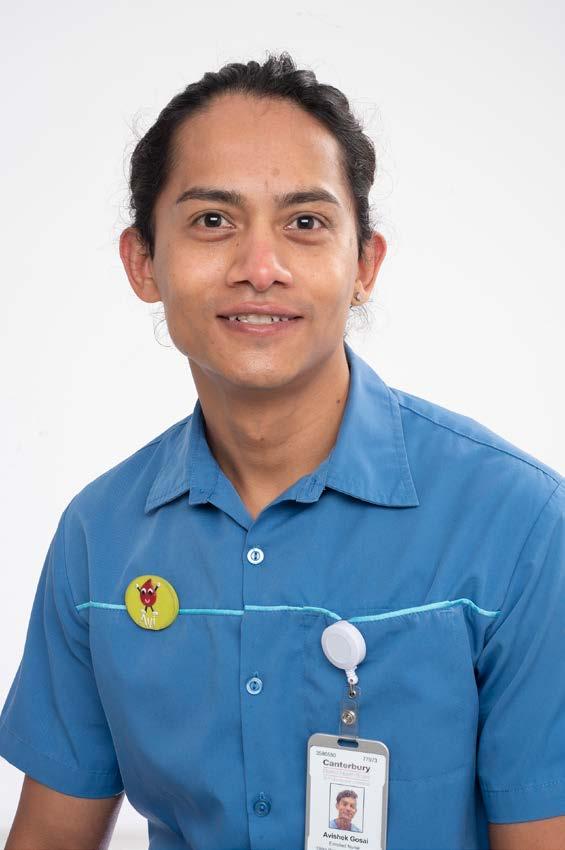
“It gave me a great appreciation of the work the nurses do there, and the pressure they are under”, Avi says.
“Once I finish my degree, I would really like to work in ED or Intensive Care. I think it’s important to expand your knowledge and challenge yourself by working in different areas. I want to make sure my nursing experience is fully rounded.
“My experiences here have inspired me and validated even more, that this is the right career for me.” Avi’s passion about, and commitment to nursing are undeniable. It’s a responsibility he relishes and certainly doesn’t take lightly.
“Nurses are so important and now, particularly with what we’ve been through with COVID-19, people really value the nursing workforce. I have been nursing for over six years now and my passion hasn’t wavered. I’m constantly excited about the exposure to new things and the learning opportunities.”
It’s not all rose-tinted glasses though. Avi understands that if he does get his first choice in October and is placed in ED, it won’t be an easy ride.
“The reality is that working in ED is challenging and high pressure and there will be days that are incredibly hard and stressful, but this is what nurses are trained to deal with. It is important for ED to have the staff, resources and support needed to really care for our community.
“I know that going from Burwood to (potentially) ED will be a huge change. I take pride in the time and level of care I give my patients and I understand that in areas like ED, I might not have that valuable time.”
Avi saw his personal nursing philosophy on display in ED when he was helping out last year.
“It’s about being kind, being empathetic. How can we make these people's journeys a little easier? I saw the Christchurch Hospital ED nurses who were so busy and tired still operate with such compassion. They’re amazing. It makes me proud to be a nurse.”
Once he has more experience and some financial stability, Avi plans to volunteer with Nurses in Action in his greatgrandparents’ homeland of Nepal.
We wish you all the very best for your nursing career Avi!
Becoming a nurse was probably always on the cards for Nursing Entry to Practice (NetP) Registered Nurse Siobhan OBrien. She left school at 17 and completed an undergraduate degree in nutrition which piqued her interest in health promotion, anatomy and physiology. Taking some time off after her degree to work, it was a personal tragedy that helped motivate Siobhan to choose her career in nursing. Her best friend’s son was in an accident and died after spending the last days of his life in the Intensive Care Unit (ICU).
“I spent a lot of time with her sitting with him in ICU and the nurses who took care of him in his last days were just incredible. They were so thoughtful, kind, compassionate and caring, and that’s when I knew that I wanted to be able to have an impact in someone’s life like they did for him and my friend. The lasting memory they have with me is how I want to be remembered by patients that I encounter in my nursing journey.”
Although Siobhan’s nursing career is only a few months old, she is loving it and relishing the personal and professional development.
“I come home every day with really positive patient and staff interactions and I feel as if I am growing my skills daily, and being introduced to new experiences every shift,” she says.
“I feel very lucky to have a job in my dream area straight out of study and I can’t wait to continue growing and learning.”

As a student nurse, Siobhan had three placements in Ashburton Hospital and managed to connect with some local patients each time she was there. It allowed for continuity of care as she was already familiar with their past presentations, and she was able to build rapport and develop relationships with the patients as well as the nursing and medical team.

The strong sense of community that working in a rural hospital provides was a key driver for Siobhan to return to the town once she qualified. A smaller hospital like Ashburton may have limited bed space in its Acute Admitting Unit (AAU) and only one resus space, but Siobhan says that only serves to sharpen the skills of the clinical team caring for the patients.
“The nurses and medical staff really have to be competent in their clinical skill and knowledge to provide the best outcomes for patients who need a bed space.”
Initially challenged with the physical adjustment to shift work, Siobhan admits she didn’t anticipate how tired she would be by the end of the working week in her first few months on the job. Something every nurse can relate to!
Now that she is settled, Siobhan relishes the responsibility she has
in her role and that she can rely on her own clinical judgement and knowledge to interact with and care for her community.
“The best thing about being a nurse would have to be the ability to have a positive impact on someone when they are potentially having the worst day of their life. I have this mindset when I go into every patient interaction and I really do feel this dictates patient outcome.”
Looking to the future, Siobhan is optimistic and encourages others to pursue this career.
“I hope that those who are considering a future in nursing, really consider taking the plunge to complete their nursing studies. It can be hard and I’m sure it is easy to only hear the negative parts of being a nurse, but I genuinely have never felt more fulfilled in a job.
“I hope that nurses continue to get the recognition they deserve for the work, time and skill they provide to the health system and I hope that nurses continue to grow their skills and competencies within their field of work.”
Compliments are regularly sent by patients who have spent time in Christchurch Hospital's General Surgery Ward A5, praising the excellent level of care patients have received.
In the latest one, the person wrote that he noticed how staff carried out their duties in a positive manner and that he received nothing but the most professional care from the nurses and doctors.
The positive engagement of her team members and the culture of support and understanding is a testament to the leadership of Ward A5 Charge Nurse Manager (CNM) Lindsey Keen. She reflects on the challenges her team has faced and how they overcame them to deliver exceptional care to their patients.
“I’m tremendously proud of the nursing team here that provides care to patients, particularly through the challenges the health sector has faced. The team works hard to deliver best practice care pre and postoperatively. This is reflected in the feedback we receive,” Lindsey says.
When she started her role in July 2022, there was a major nursing shortage affecting her team, and she knew she had to tackle the issue head-on.
So Lindsey initiated various measures to connect with her team members, including a monthly newsletter with updates, reminders, in-service sessions, and social events. She also created a staff board that showcases the faces of her team and restructured the ward's pin boards to give information, data, and resources a designated place.
Looking back at the challenges she faced when she started, Lindsey says the one outstanding thing she has learned is the importance of communication.
The Ward A5 team, back, from left Hospital Aide Brittany Calder, Registered Nurse (NetP) Neha Naidu, Registered Nurse Myles Encontro, Registered Nurse (NetP) Naomi Savage, Hospital Aide Terrie Ranson, Ward Clerk Francine Evans and Hospital Aide Fucshia Mutu
Front, from left, Stoma Nurse (Nurse Maude) Rachel Bates, Charge Nurse Manager Lindsey Keen, and Registered Nurse (NetP) Jess Zhu, and Registered Nurses Neethu Mohan, Ayreen Ginsen and Jhunaida Apurado
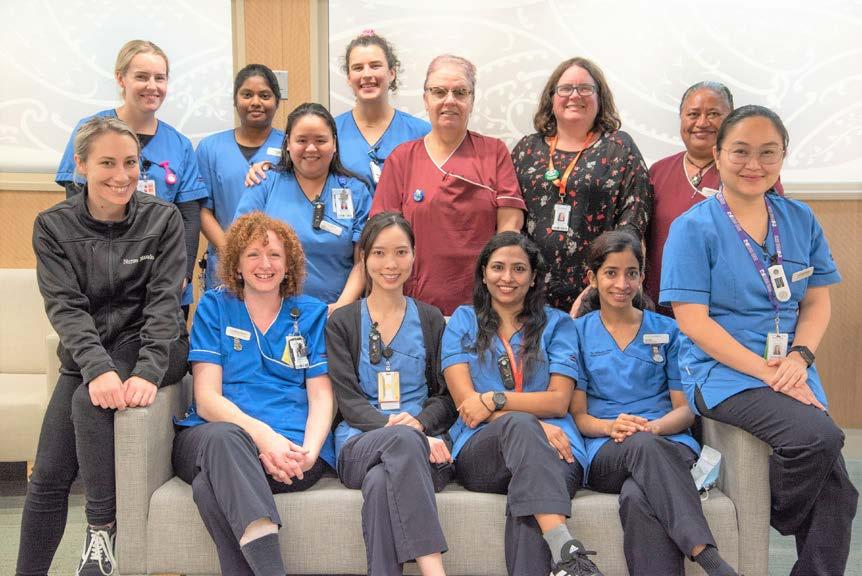
“I feel it is necessary to understand and be aware of the negatives, put them into perspective, and be present while supporting current and new relationships, knowledge, and skill.”

Lindsey says she finds it most rewarding when her team members can leave work on time, share their knowledge and seek advice to optimise care delivery.
Her leadership and commitment to her team have not only earned them recognition from patients but also fostered a positive team culture, resulting in outstanding patient care even in challenging times.
Fitness, technique and determination paid off for seven of our Waitaha Canterbury kaimahi who paddled their way to a very respectable seventh in an 82-strong field at the recent IBCPC Dragon Boat Festival.
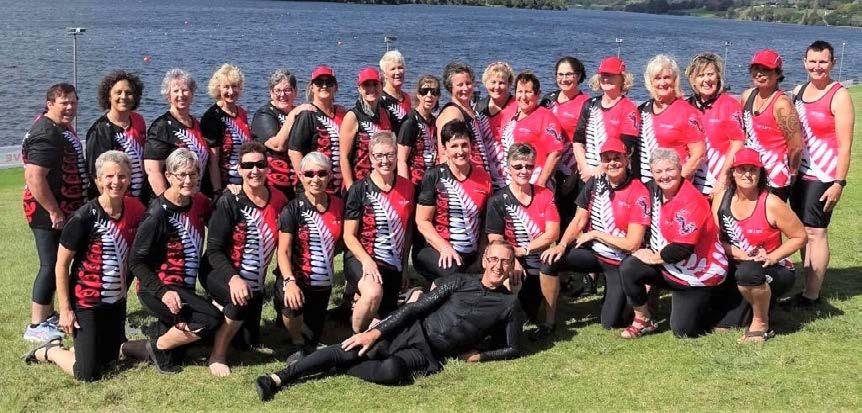
IBCPC stands for the International Breast Cancer Paddlers’ Commission and the event was held at the Mighty River Domain, Lake Karapiro, in Waipa. The week-long festival is an event for breast cancer survivors who paddle in dragon boat teams as a form of rehabilitation and empowerment.
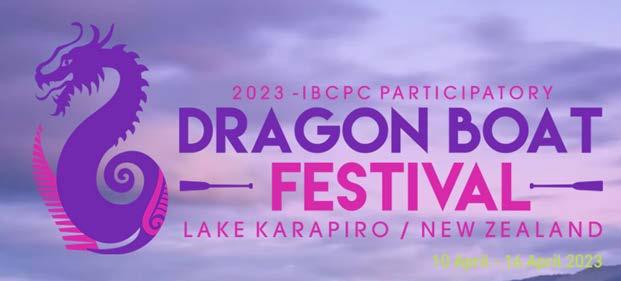
It is held every three to four years under the auspices of the IBCPC. The Te Whatu Ora Waitaha Canterbury staff – Family History Assessor and Registered Nurse Anita Hawker, Communicable Disease Registered Nurse at Te Mana Ora

Community and Public Health Barbara-Ann Harper, Medical Secretary Pam Gallagher, Acting Clinical Nurse Coordinator, Burwood Orthopaedic Outpatients Jo Russell, Occupational Therapist
Pip Boleyn, Cleaner Jedda Gill and Waitaha
Canterbury Nurse Coordinator Quality and Patient Safety Carmel Hurley-Watts – all paddled for the Christchurch-based ‘Abreast of Life’ Dragon Boat team.
Being a part of a special occasion that touches so many people’s lives is life-changing, and while it was a non-competitive participatory event, everyone enjoys a bit of healthy competition, says Carmel.
“Coming seventh out of the 82 teams was a special tribute to our team’s training and our determination to do our best on the day. We felt proud of our achievement and very grateful for the incredible support we received from our sister team ‘Amazon Hearts’, along with the Aoraki Dragon Boat Association.’”
The people of Waipa gave an amazing welcome to the 2500 paddlers and supporters in attendance and overseas visitors were in awe of New Zealand and its people.
“It was an incredible event. A sea of pink could be seen across the lake in a true celebration of life, participation, tenacity, determination, inclusiveness, courage, and solidarity amongst paddlers. I am so proud to have participated in it,” she says.
This is the first time that the festival, which involves teams from 30 countries, has been held in the southern hemisphere. The paddlers came from all walks of life and ranged in age from 20 to 80-plus. Included across the week were training sessions, races, workshops, social events (including a ‘Pink Parade of Nations’ through Cambridge) and cultural activities.
“Unfortunately, the weather was not totally kind to us on either of the racing days with very strong winds, Carmel says.
“This meant some of the racing was cancelled. No matter, everyone had a splendid time swapping pins or t-shirts from their teams and countries, with lots of laughter and chat. Such a fabulous way to get to meet people from all around the world.”
To see highlights of the 2023 festival visit YouTube here
‘Abreast of Life’ is a breast cancer survivor team under the umbrella of ‘Paddle For Life’, which also has the non-breast cancer affiliated team ‘Amazon Hearts’. If you are interested in giving dragon boating a go, or know someone else who might be keen, go to the Paddle for Life website here
Dragon boating is so much more than just keeping fit. The benefits of joining a team and participating in this activity can provide:
› feelings of camaraderie
› a sense of renewed fitness and health

› opportunities to promote awareness of a full and enjoyable life after breast cancer
› enhanced self-confidence and control of one’s life
› enduring friendships developed around the world.
Dragon boating is a competitive water sport with a history spanning thousands of years.
Originating in China, it’s now an international sport for adults, school groups, corporate teams and special interest groups, such as breast cancer survivors.
Breast cancer survivors' dragon boating is an international movement inspired by the research of Canadian Sports Medicine Specialist Don McKenzie. Starting in 1996, survivors of breast cancer joined together to paddle dragon boats to benefit their physical health and social wellbeing. It is supported internationally by the BCPC, an Associate Member of the International Dragon Boat Federation.
In races, dragon boats are decorated with dragon heads and tails. Sitting in 10 paired rows, 20 paddlers power the boats; their timing controlled by a drummer at the front, while a sweep (steerer) controls the direction from the back. Races are normally over distances ranging from 200m up to 2km. Fast, furious and colourful, it’s a great teambuilder and an exciting spectacle to watch.

 Rachel Lauchlan, Trauma Nurse Coordinator
Rachel Lauchlan, Trauma Nurse Coordinator
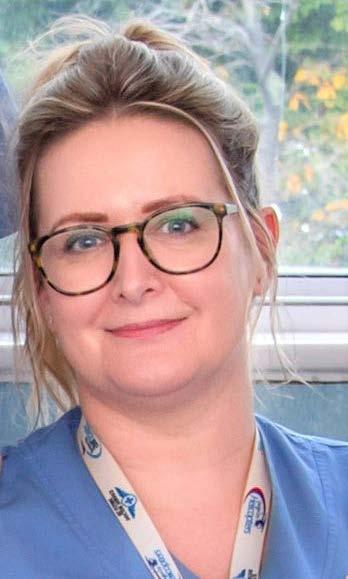
There are so many different aspects to it, and every day is different. But in a nutshell, our ultimate role is to identify and collect data for the National Trauma Registry on every major trauma patient that comes into the hospital. We work closely alongside our General Surgery trauma doctors to help coordinate care between the different specialities involved with the multi-system injured patient, ensuring every team that needs to, sees the patient, and contributes to their plan of care. We also attend trauma calls in the Emergency Department (ED) and follow the patient journey through, assisting and supporting the multi-disciplinary team to look after this complex patient group who never quite fit neatly into any one pathway of care.
What pathway got you to this job?
I guess I have always worked in the ‘acute’ side of nursing. I trained in the British Army and served seven years (including a deployment to Iraq where I really got to put my trauma nursing skills into practice). I’ve spent my many nursing years since in New Zealand, consolidating and growing my skills and knowledge base working in ED, the Intensive Care Unit and Air Retrieval, before taking on this TNC role just over two years ago.
What advice would you give someone keen to enter your field?
I would advocate that a breadth and variety of experience and knowledge is key in this role. You’re never going to know everything there is to know about trauma (or anything for that matter) but having a good overall foundation to build on, knowing how to utilise resources, plus a passion to help make a difference is a great place to start. I would encourage anyone keen to give it a try. I still feel like I learn new things every day in this role.
Who inspires you and why?
I have worked with various colleagues in my time who are extremely knowledgeable, passionate, willing to teach, humble in their approach, and dedicated to what they do. They all in their own ways have inspired me to try and emulate their approach.
What do Waitaha Canterbury’s values (Care and respect for others, Integrity in all we do and Responsibility for outcomes) mean to you in your role?
Those values are core to the role and I always try and approach things first and foremost by treating others how I (or a loved one) would wish to be treated. Respect and kindness go a long way.
If you could be anywhere in the world right now where would you be?
With my family, at their house in Italy, overlooking the lake with a wine in hand.
Who would you want to play you if there was a movie made about your life?
There won’t be, but probably Kate Winslet, another blonde (age appropriate) Brit!
What are your hobbies/interests outside of work?
You’ll usually find me on long walks with my dog Eric or socialising with friends over good food and wine.
If you would like to take part in this column or would like to nominate someone please contact Naomi.Gilling@cdhb. health.nz.
E ngā maunga, e ngā awa, e ngā iwi e pānui mai nei, tēnā koutou katoa.
To the mountains, the rivers and the tribes that are reading this, greetings to you all.
This week we are going to revisit a kaupapa (topic) from last year, that is kīwaha or idioms. These are very important within te reo Māori and are frequently utilised in daily conversation. You will see some kīwaha Māori below along with a simple example of how you can utilise each saying in your everyday kōrerorero (dialogue).
Kei konā katoa ahau
Complete and utter support
Your patient might suggest a course of action that you completely and utterly agree with. To indicate your support and agreement, you could say “Kei konā katoa ahau”.
Kia pai mai hoki!
That is fantastic! How neat is that?
A child you are looking after may have been extremely brave while an intravenous line was inserted. You could exclaim “Kia pai mai hoki” to let the child know how fantastic that was.
Hangareka ana!
What a crack up!
When someone says something that makes you laugh, instead of saying “that is hilarious” you could say “hangareka ana”.
Kua pakaru te pūkoro
Broke
If your colleague is asking you to shout them a kawhe (coffee) for the fourth time this week, you could say “kua pakaru te pūkoro” to let them know you are completely broke.
Kaha te kata (KTK)
Laugh out loud (LOL)
Use KTK where you would normally use LOL, particularly in “text speak”.
Nē? or Nē rā?
Is that so?
You could use this when someone tells you something that you don’t necessarily believe, or to indicate your surprise at something. It is dependent on how you say it, as it is in English.
Kia tau
Relax, settle down
You could use this kīwaha when attempting to soothe a child that is upset when their parent or guardian leaves, “Kia tau”.
He whakapātaritari – A challenge
Take a tally of how may times a day you use these words above and then interchange the English words for the Māori words.
Puritia te reo ki te tihi o whakaaro, ki te iho o ngākau. Kia ora rawa atu!

Hold the language at the forefront of your mind and the depths of your heart. Thanks very much!
On 6 May 1869 colonial troops invaded the Urewera to punish Tūhoe for supporting Te Kooti Rikirangi, whose ‘rebel’ force Tūhoe had sheltered following a battle in which they were defeated, at Ngātapa. There was also an intention to send a message that there was no sanctuary for disaffected Māori. The 1300 men invading outnumbered the entire population of the Urewera. Five Tūhoe were killed and settlements, crops and food supplies were destroyed.
Colonial troops invade the Urewera | NZHistory, New Zealand history online
Kōrerotia te reo, kia ora tonu ai.
Speak the language so that it remains a living language.
If you have any questions or feedback, please make contact via the email below.
Hauora.Maori@cdhb.health.nz
A lot of people are talking about the benefits of consuming bone broth these days, for their pets and themselves.
Bone broth contains many beneficial nutrients including:

› High amounts of various minerals
› The protein collagen
› The amino acid glycine
› The joint-improving nutrients glucosamine and chondroitin.
Bone broth is said to have the following potential health benefits:
› Anti-inflammatory effects
› Assist weight management and gut health
› Joint and bone heath
› Sleep and brain function.

Pet version:
› Bones of your choosing
› 2 tbsp apple cider vinegar
› Water
› 3 carrots chopped (optional)
› Spinach or silverbeet (optional)
Human version:
› Bones of your choosing
› 2 tbsp apple cider vinegar
› Water
› 1 large onion chopped (optional)
› 3 carrots chopped (optional)
› 3 stalks of celery chopped (optional)
› Spinach or silverbeet (optional)
› 3-4 cloves of garlic smashed (optional)
› Herbs of your choice to taste (optional)
It is easy to make, especially if you have a slow cooker. You can use a pot, but you will have to carefully monitor it on the stove and never leave it unattended.
The bones:
Use one or a mix of pork, lamb, beef bones or chicken carcases. The bones can have fat attached (this will be removed in the cooling process) and should have some flesh and tendons attached. Joints, knuckles and marrow bones work best.
Some people opt to season and roast their bones before slow cooking (human version only) but this is not necessary. You can also use cooked bones (such as leftover roast chicken).
Method:
Put the bones in your slow cooker and put in just enough water to cover them (don’t fill to the top as it can bubble over). Add the apple cider vinegar and set at ‘high’ until the water begins to bubble.
Once bubbling, set your slow cooker to ‘low’. You want to cook this for approximately 18 to 24 hours. With around six to eight hours of cooking time left, you can add your vegetables and herbs. Adding these for the full duration of the cooking process can make the broth bitter.
Once your broth has cooked for the desired period (18 – 24 hours), turn off your slow cooker and allow the broth to sit for an hour or so to cool a little.
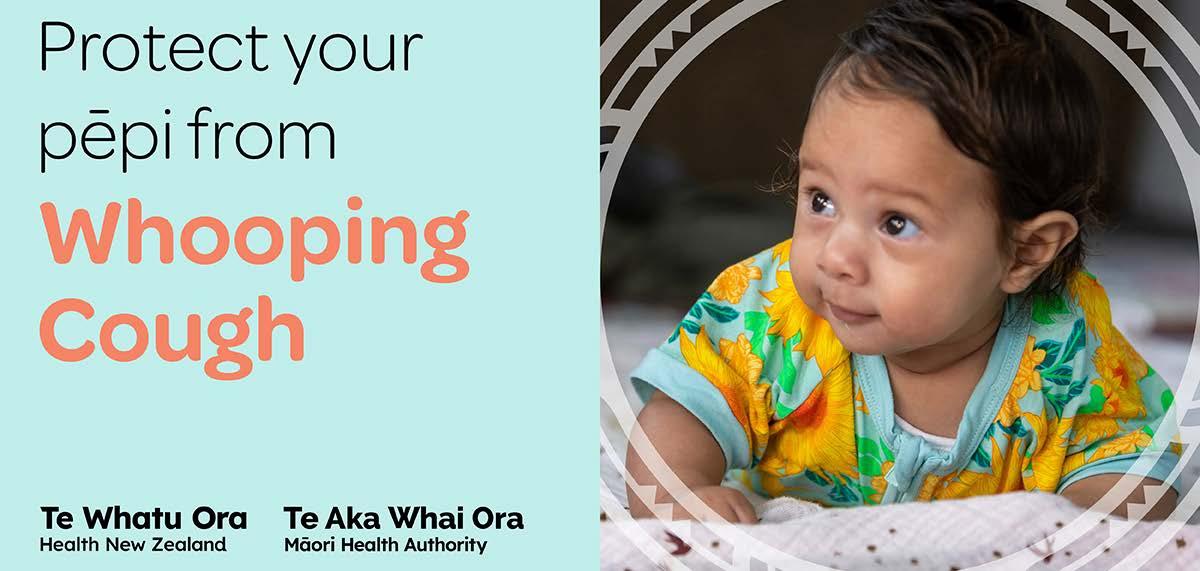
Ladle the broth through a strainer into large bowls/ jugs. You can retain some of the meat if you wish to use it or treat your pets.
Put the bowls/jugs of broth in the fridge and leave overnight. Depending on the bones you have used, you will find a thin or thick solid layer of fat on the top. Carefully remove this and discard.
You should find that your broth has a thick, jelly-like consistency. You can store it in a sealed container in your fridge for about five days or freeze for up to three months.
Pets:
Do not add any seasoning to your pet’s broth. It’s recommended that pets can have around a tablespoon per day.
You can freeze the broth in an ice cube tray. In summertime, these make refreshing treats for your dog (or cat). You can also add other little treats (blueberries, carrot, kibble) and freeze into popsicles.
Warm a cube or two of the broth in the microwave and pour over your pet’s food. They love it!
Humans:

You can season your broth with salt and pepper as desired. Some people drink half a cup of bone broth every day, but this may not be palatable for all. Use the broth in soups, stews, and any dish that you would normally add stock.
We would love you to share your favourite winter dishes from around the world. Hearty, healthy (or a little naughty is okay too!), tasty and simple dishes that express your culture, a place that means a lot to you, or just food you love to eat. Click on this link to submit. If you have any issues, please email communications@cdhb.health.nz
My wife had a chest inserted central catheter line placed to make access for chemotherapy much easier. The attending specialist was a gentleman named Steve, but I am unable to supply his surname. His manner was excellent, and he took the time to fully explain everything about the procedure before treatment commenced. It was an absolute pleasure to be treated so well and my wife and I would like to commend him for the fantastic way in which he went about performing his duties. Also, the nurse who looked after us on the day was Yasmin Anderson. She was thoroughly pleasant and conducted herself in a professional, efficient, caring and friendly manner. So much so that we feel compelled to write in complimenting her on her wonderful manner. My wife and I felt extremely well cared for throughout our time in the unit under her care and would greatly appreciate her being made aware of just how much we valued her nursing care of us on the day. She is an absolute treasure and adds much value to nursing profession as a whole.
I cannot praise the medical team enough. I have nothing but compliments for the professional way everyone conducted themselves. Special thanks to Dr Abbott and all the amazing nurses who treated me with such respect and compassion. Thank you!
Thank you so much to all you lovely people here on Ward B2. I am so grateful for all the care and help you have shown me during my stay. It may be a while before I get the feet on the pedals again...but I will. You guys are just the best.

I work as a Registered Nurse (RN) for Te Whatu Ora Waitaha and recently experienced being on the other side as a patient. The nursing staff there were amazing throughout my entire stay, treating me with kindness, expertise and knowledge. I felt in very safe hands, especially through all the shifts where their staffing was tight, I felt incredibly supported and cared for including by the ICU outreach team, who delicately placed an IV line in my very bruised arms, with tricky veins and the charge nurse, who ensured I had privacy; looking after staff is always tricky. A special shout out to Catering Assistant Lorraine from WellFood who went out of her way to help me. I had been on clear fluid only for almost a week, when I was eventually allowed to eat, I have some dietary requirements that made things tricky, Lorraine went out of her way to ensure I had everything that I needed.

Excellent care, even as we understand that hospitals are under constant pressure and understaffed.
Recently our dear mum passed away, she was in Ward 23. We feel we must pass on our appreciation of the great staff on the ward that night. All the staff were very caring and respectful of our situation. Nurse Chris who looked after Mum was exceptional. He was friendly, caring, empathetic and respectful. He kept us informed and helped us through a difficult time in a professional and calm manner. Please pass on our thanks to Chris and the team on Ward 23.
The treatment in both departments was excellent, the staff were friendly, caring and very professional. The new ED was very impressive, spacious, comfortable, efficient and functional. Please pass on my appreciation to the staff on both wards, they are a credit to their profession.
What a team you are, and I thank you all for making my stay here in Ward D1 amazingly good, so that I am walking out. Thank you and God bless you. So many of you have been special to me in all sorts of ways.
What Eve did not know is that prior to bringing my friend to the ward, my brother-in-law had passed away and I had buried him two days prior to meeting Eve. So, my grief, sadness and emotions were all over the place and I was breaking down. From the moment Eve walked through the door to greet and meet us, she displayed absolute manaaki and whanaungatanga. I felt at peace and like my whānau member was really going to be taken care of. Eve is a very polite, professional person and I know in my heart of hearts that she treats everyone the exact same way – with kindness, compassion, empathy and love – all the things that an unwell person wants and needs. Not only does Eve do this for the patient, she also does it for the whānau and friends who are present. She goes above and beyond her normal duties of mahi and really takes care of the people she is around. She makes heaviness disappear with such ease and instead fills the space with warmth, aroha, and light, both relaxing and comforting people at the same time. I want to give the biggest thanks and appreciation towards this woman because I don't even think she herself knows how much of a blessing and Godsent angel she has been for not only myself but
for my whānau as well. So, thank you Eve. Aroha mutunga Kore ki a koe and may God’s grace continue to guide you and bless you wherever you may go.

From ambulance pick up to ED and then into the ward before surgery I felt very well cared for by the amazing staff.
Excellent punctual and first-class service. I was very impressed. All my experiences in recent times have been positive.
The process of my husband being seen was efficient and he was seen quickly. The Colorectal administration staff sent everything they needed to in the mail and were really lovely, as were all staff who they saw.
I would like to take this opportunity to thank all those who looked after me during my stay. There are obviously a great number of professionals into whose care I was entrusted, from the doctors, the technicians, the nurses, the specialists and not forgetting those in ED, my very sincere thanks, I could not have been in better hands. This band of hardworking individuals showed at all times the utmost professionalism, caring, understanding and friendliness. They always took the time to explain what they were doing and nothing, but nothing, was too much for them. I would also like to express my thanks to the catering staff. When eventually I was taken off ‘nil by mouth’ I would like to say that the variety of meals, the presentation, the taste, and the care taken to ensure I was well looked after and was appreciated. To you all I offer my utmost thanks, I could not have been in better hands.
Thankful for the authentic connection with Dr Burt, Gina and Allison, for their teamwork in treating and taking care of my chronic condition. They treated me with dignity and respect and were diligent around my hesitations.
Ward A4, Christchurch Hospital
The staff are fab.
X-ray, Christchurch Hospital
Lovely warm communication. Friendly.
With the launch of New Zealand Sign Language (NZSL) Week today, one of our kaimahi, Mana Taurite Equity, Diversity and Inclusion Coordinator Zak Newport is sharing her personal experience.

Zak, whose māmā (mum) El Alamein Matthews is Deaf, says growing up she experienced first-hand some of the barriers that Deaf people face.
One of the biggest struggles was taking on the whakamā (shame) that her māmā felt about being Deaf.
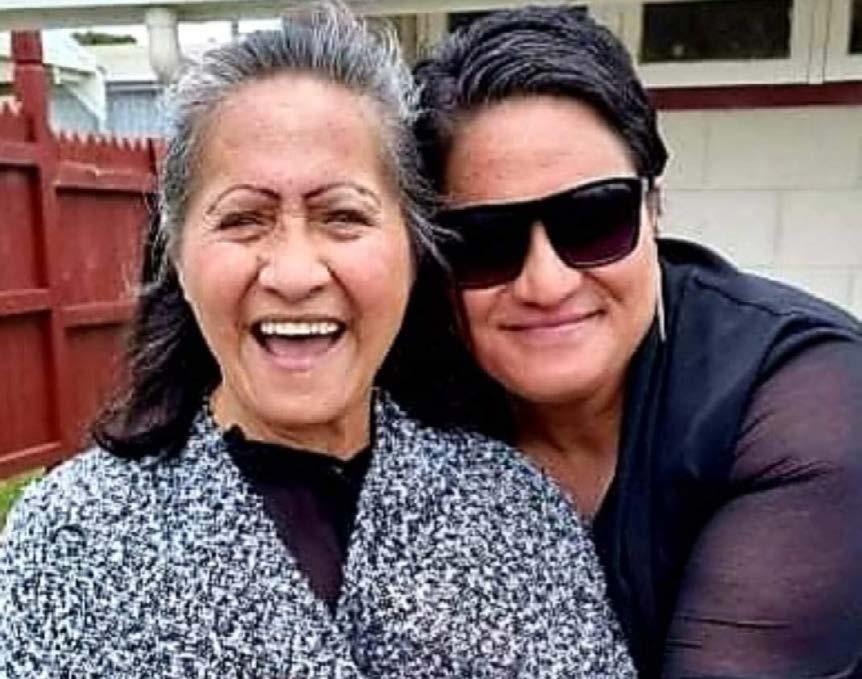
“It was hard when people would talk directly to me instead of my māmā, who was standing right there with me. I’d often need to remind people, especially at appointments, to please address her directly, as although she had limited hearing she could lip read.”
Ignorance can be a big barrier, Zak says.
“I really hope that people can be more considerate and not assume, as many people’s degrees of deafness will be different.”
Some tips that Zak has when engaging with someone who has a hearing impairment or is Deaf is to always look at the person, make eye contact, and take time to listen, also for those who are Deaf or hearing impaired to open up to those who are willing and trying to communicate with them.
Zak says she encourages people to give Sign Language a go.
“The Deaf community are always appreciative of people including them, however big or small, rather than not at all.”
The vision for NZSL Week is to increase awareness and understanding of NZSL and the Deaf community and to empower and strengthen the Deaf community. NZSL Week lets Deaf New Zealanders put their hands up and be seen!
A 2017 report commissioned by the National Foundation for the Deaf estimated 880,350 people in Aotearoa New Zealand (18.9 percent) live with some form of hearing loss and the 2018 Census statistics show that about 4599 deaf people use NZSL as a form of communication and 23,000 people in total use NZSL.
This week there are lots of events happening across the country and a whole range of resources available to help celebrate NZSL Week. For more information visit: www.nzslweek.org.nz/
We also have our own Sign Language video from last year you can watch with one of our Deaf kaimahi, Data Entry Clerk Denise Godman, here: New Zealand Sign Language on Vimeo
If you want to try and learn some Sign Language, the New Zealand Sign Language Dictionary website: www.nzsl.nz/ is a great place to start, they also have an amazing app you can download that has some easy to follow video clips.
Make sure to give it a go and get your hands ready to sign.

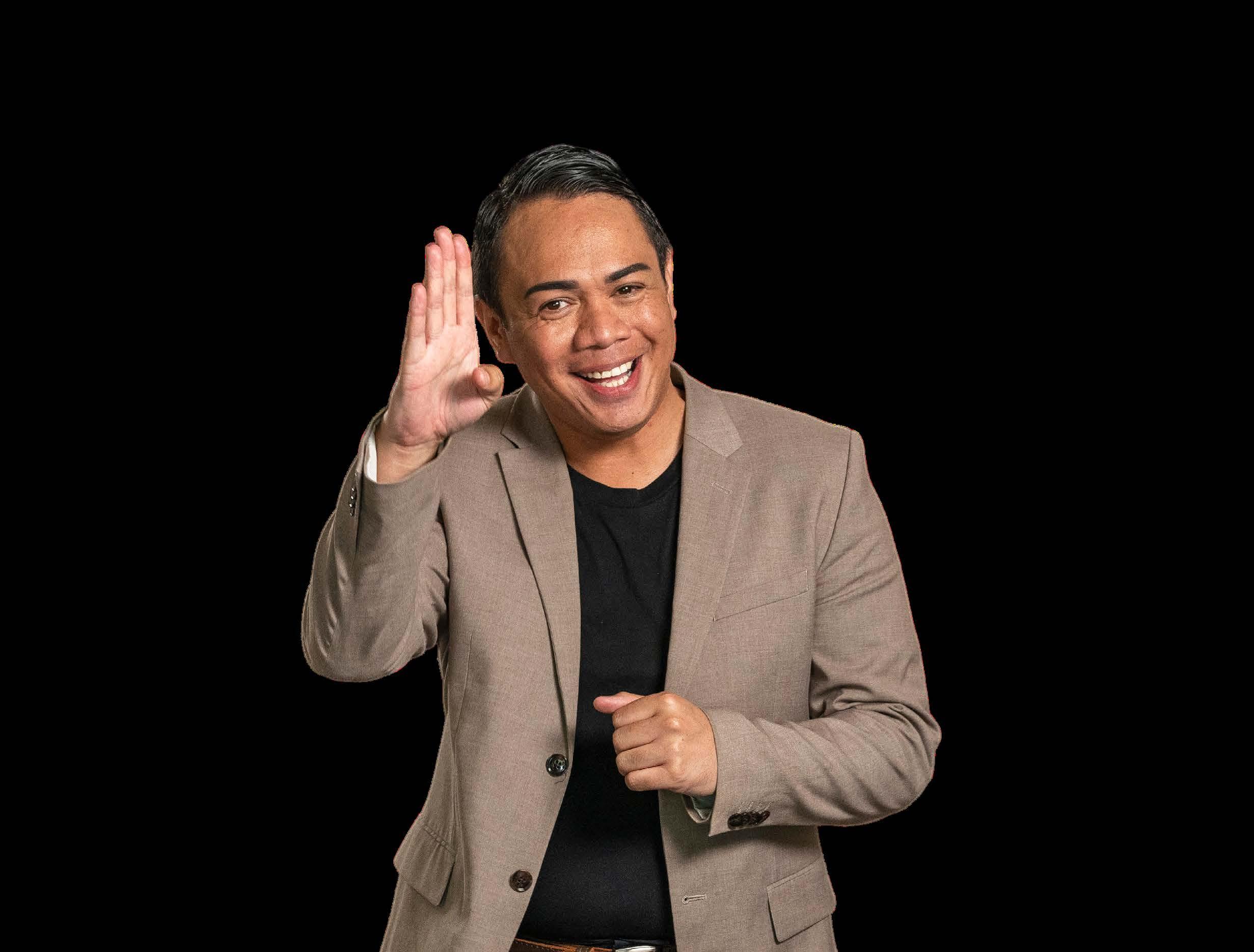



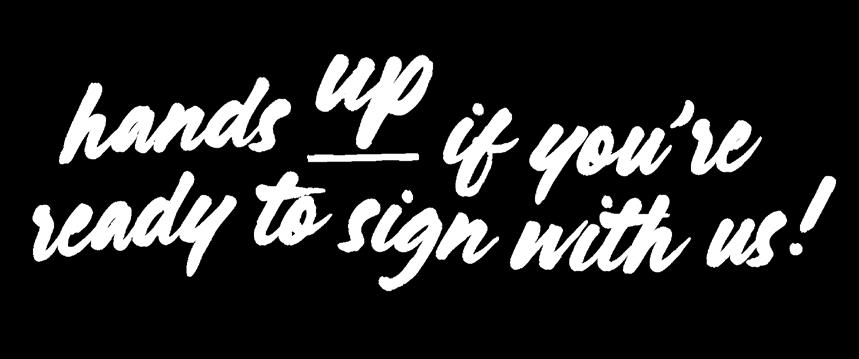

If you’re a health professional, can you check your family member’s laboratory test result on Health Connect South while you’re at work?
Are patients allowed to use their smartphone to record a clinic consultation?
What’s the risk of sending patient information to your personal email account?
Can a mix-up with a patient's address cause serious harm?
What should you do if a patient asks you to change your clinical notes?
Would you like to learn more about privacy and how it relates to the work we do and the people we care for?
8 – 14 May 2023 is Privacy Week. This event is an excellent time to tell you about the new Privacy Policy and Privacy Breach Response Procedure for Te Whatu Ora Waitaha Canterbury and Te Tai o Poutini West Coast.
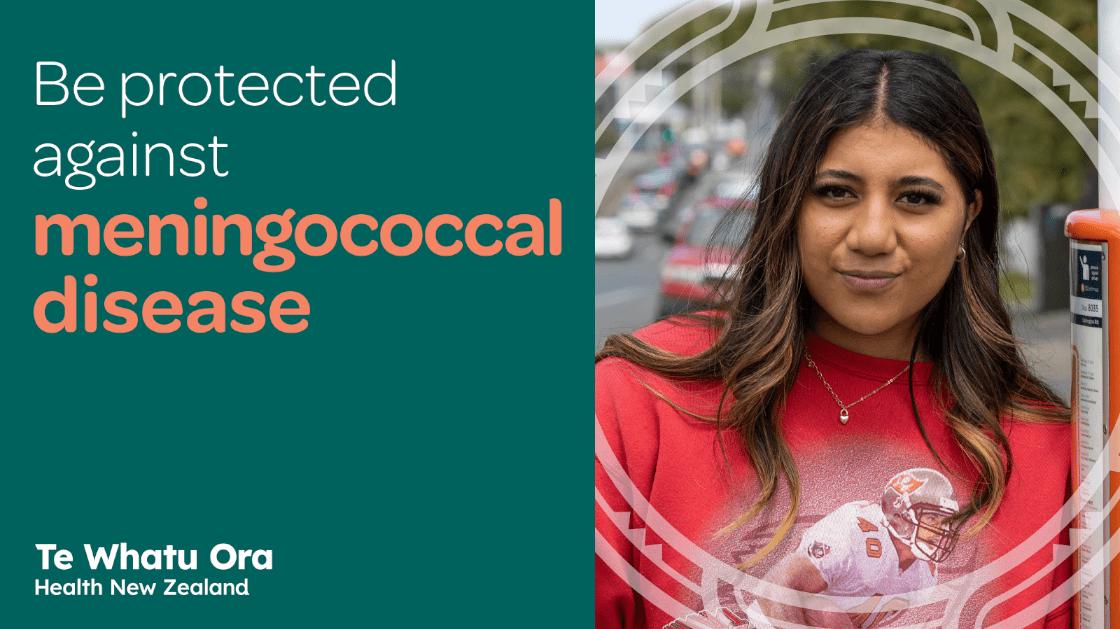

These resources will guide you on privacy requirements and explain how they apply in practice. They also support our personnel in dealing with complaints and potential breaches of privacy.
For more information, contact your Quality Team or the Chief Privacy Officer at Legal.Services@cdhb. health.nz

This week is the first Pacific language to be celebrated as part of the Ministry of Pacific Peoples Pacific Language Weeks.
Sunday 7 May – Saturday 13 May is Rotuman Language Week. Rotuma Island and nearby islets are home to an indigenous Polynesian people known as Rotumans who predominantly reside in the mainland Fijian Islands.
Rotuma is the 12th largest volcanic Island of the Fijian Islands. The majority of Rotumans, around 10,000, live in Fiji with a small minority of 2000 remaining on Rotuma. With the Rotuman language being spoken predominantly on the islands it is important that the language and culture is kept alive and celebrated especially for the 1000 Rotman who reside here in Aotearoa.
For many minority groups living remotely, away from their homeland, the connection to culture and language is an important part of their identity. This is the kaupapa behind the launch of the Pacific Language Weeks. Each language week will have its own unique theme, for Rotuman Language Week their theme is Vetakia ‘os Fäega ma Ag fak hanuaSustaining our language and culture.

Enabling and celebrating language plays a significant role in the daily lives of our Pasifika communities. A recent report shows that 90 percent of Pacific people use Pacific languages at community meetings and 82 percent use Pacific languages with community members at least some of the time.
Pacific language use in recreation, sport and interest group activities is an emerging area, with 39 percent of those taking part in Pacific performance, recreation activities, at sports grounds or at sporting events using Pacific languages.
There are several activities and events being held throughout Aotearoa showcasing the rich Rotuman language. For more info about these and other resources you can find these on the official Ministry of Pacific Peoples Website here.
Something for You is the Te Whatu Ora - Waitaha Canterbury employee benefits programme. The deals offered are from the New Zealand business community to say thank you for all that you do. Please see below offers for you.
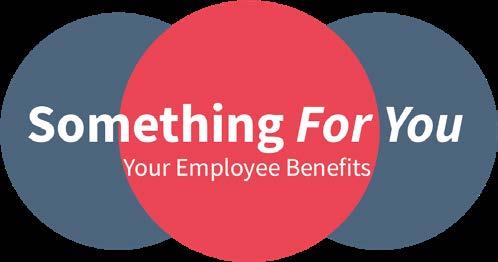
Torpedo 7 – 90 Clarence Street and Northlink Centre, 148 Langdons Road
Torpedo7 would like to offer year-round discounts to our staff (up to 40 percent off) on huge range of gear. Show this flyer instore printed out or on your device.
Sculpt Reformer Pilates – 62 Mandeville Street, Riccarton - 203 Cashel Street, Christchurch
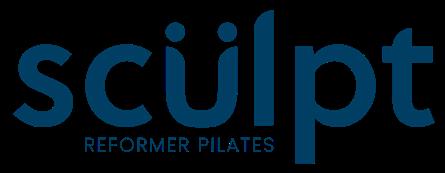
Intro deal: Try five classes for $45. Valid for 14 days from first booking, new clients only. See booking information here.
Greenroots Juicery
Offering cold-pressed, local, organic juice cleanses, juice packs and wellness shots. Get 20 percent off all products online View discount code here
Sunglass Hut
Receive 15 percent off all full-priced sunglasses. Please see more information here. Promotional code must be presented at time of appointment and ordering.



The Health Quality & Safety Commission’s He Hoa Tiaki | Partners in Care team is hosting a one-day forum at Te Pae, Christchurch convention centre. It will focus on te huarahi ki pae ora | the journey to healthy futures.


Date: 25 May 2023
Time: 9.30 am to 4.30 pm Location: Te Pae, Christchurch convention centre
The event will run from 9.30 am - 4.30 pm. A networking function will follow this from 4.30 pm6.30 pm.
To read the full programme or register visit: www. hqsc.govt.nz/OurVoices.
1. a. Fruit – Botanically, anything that grows from a flower is a fruit but because it is savoury from a culinary point of view, we categorise and eat it as a vegetable.
2. b. They have the highest known concentration of vitamin C – up to 2907 mg per 100 grams; 100 times more than an orange and if you ate just 100g of the fruit, you would consume around 3000% of your recommended daily intake of vitamin C.
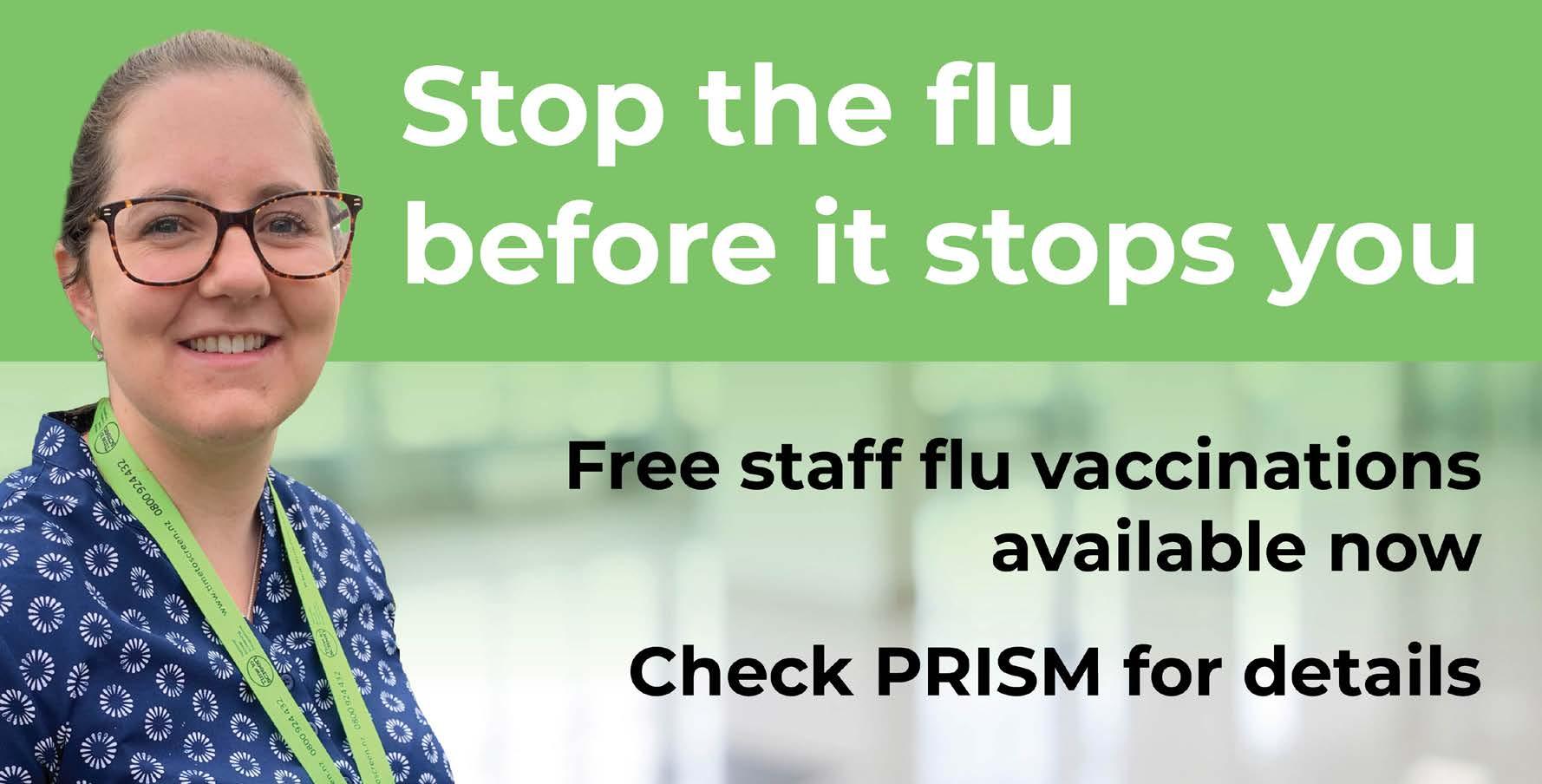
3. d. Bananas. Americans eat around 12kg of bananas per person each year, and Kiwis eat around 18kg per person each year. Neither comes close to Papua New Guinea where 112kg of bananas are consumed per capita, each year.
4. b. Potato – The potato plants travelled on the Space Shuttle Columbia.
5. c. Brazil produces of 17 million tons of oranges each year.
6. a. South America. Kūmara was first domesticated in Peru as long as 8000 years ago.

7. a. True. Orange carrots are actually quite new having been bred by Dutch horticulturists in the 1600s. The first carrots were white, purple and even yellow.
8. c. Brussels sprouts.
9. d. All of the above.
10. b. Blueberry
For more information on our speakers and their topics, visit our website www.healthprecinct.org.nz


by

Manatū Hauora in collaboration with Te Whatu Ora and Te Aka Whai Ora are hosting two webinars to celebrate International Nurses Day. The theme for 2023 ‘Our Nurses Our Future’ – shines the light on nurses globally, sets the direction for nursing in the years to come and on a brighter future to address global health challenges. The final agenda will be sent prior to the event.
WEBINAR 1
Thursday
11 May 2023
12.30pm-2.00pm
• Includes talks from Dr Amelia Latu Afuhaamango Tuipulotu – Chief Nursing Officer, World Health Organisation, Elizabeth Iro and Margaret Dotchin – Chief Nursing Officer, Te Whatu Ora
| Te Toka Tumai, Auckland
• Topics will include Global and workforce issues
• Zoom details
https://mohnz.zoom.us/j/88681287209?pwd=Ylh2citNcmMwUFhSTHphMVk5cE1LUT09
Passcode: Fc5yAA8LRQ
Or One tap mobile :
+6448860026,,88681287209#,,,,*4121391134# New Zealand
+6498846780,,88681287209#,,,,*4121391134# New Zealand
Or Telephone:
Dial(for higher quality, dial a number based on your current location):
+64 4 886 0026 New Zealand
Webinar ID: 886 8128 7209
Passcode: 4121391134
International numbers available: https://mohnz.zoom.us/u/kr0D0tc0y
WEBINAR 2
Friday
12 May 2023
2.30pm-4.00pm
• Includes talks from Margareth Broodkoorn - Chief Executive, Hauora Hokianga, Kingi KirionaDeputy Chief Executive, Mātauranga Māori, Te Aka Whai Ora and Riana Manuel - Chief Executive, Te Aka Whai Ora
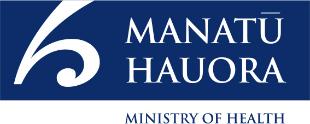
• Topics will include indigenous aspects of nursing in Aotearoa

• Zoom details
https://mohnz.zoom.us/j/89417411144?pwd=SEEvaVlnUi9MdmdYaXNlQjNNNjVUUT09
Passcode: Mq2fKVfzmi
Or One tap mobile :
+6448860026,,89417411144#,,,,*8453123998# New Zealand
+6498846780,,89417411144#,,,,*8453123998# New Zealand

Or Telephone:
Dial(for higher quality, dial a number based on your current location):
+64 4 886 0026 New Zealand
Webinar ID: 894 1741 1144
Passcode: 8453123998
International numbers available: https://mohnz.zoom.us/u/kfTae4S1g